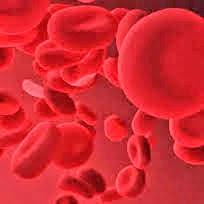Its another day and another disease is in the spotlight. As always I shall draw upon my personal experience as much as possible, although with this one that is a bit harder for me. As always, if you have recently been diagnosed with Hughes Syndrome or have been fighting it for years do get in touch and share your experiences.
So here we go... Hughes Syndrome or also known as Antiphospholipid Syndrome.

What is Hughes Syndrome?
Hughes syndrome put simply is a disorder of the immune system that causes increased risk of blood clots....and that's just the simple version. As with many diseases that I will cover here, this is another one that comes from our immune systems producing antibodies, this time called antiphospholid antibodies, that work to attack proteins that are attached to fat molecules, creating what is commonly known as "sticky blood"
As you have probably already guessed, this reaction can lead to excess blood clots in the legs (deep vein thrombosis), strokes, heart attacks, miscarriages and can lodge themselves in any area/organ of the body. Now this may be alarming to you and the first thing I will say is DON'T PANIC. Stress and panic are possibly the worst things you can do, although I know that is easier said than done.

Current statistics suggest that Hughes Syndrome is responsible for 1 in every 6 strokes in people under the age of 50. It can affect men and women and can be a stand alone disease not connected to any others at all. For me I have Hughes syndrome as part of my mixed connective tissue diagnosis and I have known about it since last October when the first blood tests came back suggesting "sticky blood". Needless to say I was terrified - probably more so of this than anything else going on with my body and I will explain why later.
Hughes syndrome is generally treated with blood thinners for life. Currently there is no cure but it can be treated to make sure that you can rest in the knowledge you are limiting your risk.
What are the symptoms to look out for?
The most obvious concern is if you have had blood clots before, whether they are in the lungs, legs, heart, this is often the time that people with the stand alone disease will find out that they have it. For me and many others, I found out when they did a blood test for other antibodies other than Lupus - showing up the Scleroderma and the Hughes syndrome etc.
There are a variety of symptoms that come with Hughes syndrome that you wouldn't normally attribute to a blood clot so it is important to remember these;
- Fatigue
- Joint pains
- Dizziness and/or fainting
- Vision problems such as double vision
- repeated severe headaches or migraines
- Pins and needles or a tingling sensation in limbs
- Memory and speech problems
Stroke symptoms
A stroke or a TIA (mini stroke) happens when a blood vessel within the brain is blocked restricting or completely cutting off the blood supply to the area affected. The quickest way to remember the symptoms of a stroke is to remember the word FAST;
F = Face - Has their face drooped on one side, can they smile with both sides of the mouth?A = Arms - Can they raise both arms to the same level or is one arm paralysed?S = Speech - Is their speech slurred or mumbled?T = Time - Ring for an ambulance as speed is the key

Heart Attacks
A heart attack occurs when a blood vessel in the heart is blocked, again restricting the blood flow to the area. Like stroke these are potentially lethal and the faster you act the better the prognosis.
The symptoms of a heart attack or cardiac event are as follows;
- Chest pain, often located within the center of the chest - sometimes described as pressure or tightness.
- Pain traveling outwards from the chest affecting other areas of the body such as the arms or jaw.
- Shortness of breath
- Feeling or being sick
- An overwhelming panic (similar to a panic attack)
- Feeling light headed
How is Hughes Syndrome diagnosed?
Diagnosis for me was down to blood tests for the specific antiboidies, including the lupus anticoagulant (actually nothing to do with lupus at all). For many women, there wont be a diagnosis until they have experienced recurrent miscarriages - something I feel needs to change in the UK as you should be tested during your first pregnancy in my option.
The blood tests are the best way to gain a firm diagnosis of Hughes and these will be taken alongside your medical history, even if you have never experienced a blood clot before.
My experience with Hughes Syndrome
Unlike the other spotlight diseases, this is one where I am not going to explain my journey in its fullest. I am simply not ready too and I am still coming to terms with this one as it scares me so much. There are things I shall say however, so here goes.
Since I was in my mid 20's I have been terrified of blood clots. This comes down to the fact that in 2008 my father had a massive stroke. His stroke was a brain hemorrhage and it is the one day in the entirety of my life that I will never forget! Heart breaking doesn't even come close to the mixture of emotions I went through in a 24 hour period; from the drive to the hospital, too seeing my dad in an unimaginable state, to lying awake all night. Ever since then I have actively raised money for the Stroke Association, learnt as much as I can about strokes and developed a fear of blood clots. So it was not great to find out that I am at risk in the future - in fact it was the worst piece of news I was given and that says a lot when you are facing Lupus, Scleroderma etc etc.
Since I found out about the sticky blood I have read as much as I possibly can about it, talked a lot to others, changed my future plans for having children and spent many nights considering the impact this will have on me. In short I have decided that it is no different from everything else I am facing. It is just another fight, I will remain in battle and what happens in the future happens. I shall live for now!
